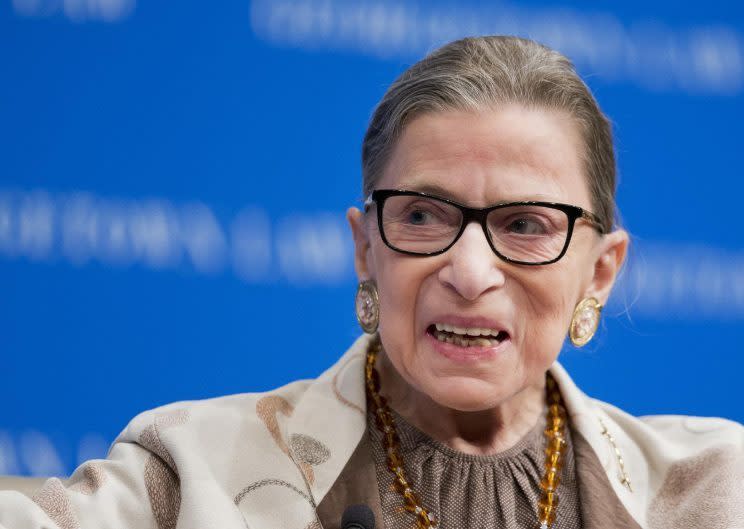Ruth Bader Ginsburg apologizes for bashing Donald Trump
After considerable backlash, Supreme Court Justice Ruth Bader Ginsburg apologized on Thursday for her recent comments on presumptive Republican presidential nominee Donald Trump.
“On reflection, my recent remarks in response to press inquiries were ill-advised and I regret making them. Judges should avoid commenting on a candidate for public office. In the future I will be more circumspect,” Ginsburg said in a statement, obtained by the Washington Post and other outlets.
The left-leaning justice had called the real estate magnate egotistical and inconsistent. She also joked about possibly leaving the country should he be elected president. She made the comments in interviews with the New York Times, the Associated Press and CNN.
Many people feel that a Supreme Court justice publicly condemning or supporting a candidate for the Oval Office could call into question his or her impartiality. And her critics were not exclusively from the Republican Party.
Many liberals who actually agree with her assessment of Trump argued that she should have refrained from commenting publicly because of her role within the United States’ democratic system.
The editorial boards of both the New York Times and the Washington Post published opinion pieces earlier this week criticizing Ginsburg for her remarks.
Like clockwork, Trump also waded into the discussion about himself on Twitter, attacking Ginsburg and demanding an apology Wednesday night:
Is Supreme Court Justice Ruth Bader Ginsburg going to apologize to me for her misconduct? Big mistake by an incompetent judge!
— Donald J. Trump (@realDonaldTrump) July 13, 2016
Even the @NYTimes and @WashingtonPost Editorial Boards condemned Justice Ginsburg for her ethical and legal breach. What was she thinking?
— Donald J. Trump (@realDonaldTrump) July 13, 2016
If I win the Presidency, we will swamp Justice Ginsburg with real judges and real legal opinions!
— Donald J. Trump (@realDonaldTrump) July 13, 2016
The Code of Conduct for United States Judges clearly prohibits judges from publicly endorsing or opposing candidates for public office.
However, members of the Supreme Court are technically exempt from the code, even if they consult it for guidance. In recent years, several politicians have pushed for the Supreme Court to adopt its own code of ethics.

Top brass in the Republican Party, including House Speaker Paul Ryan and Senate Majority Leader Mitch McConnell, said it was inappropriate for someone on the Supreme Court to enter the public discourse over presidential campaigns.
But she did have her defenders. Lawrence O’Donnell, a political pundit for MSNBC, argued that Ginsburg did not cross any line and that there is nothing preventing her from running for president herself. After all, he said, three justices ran for president in the 19th century. None of their campaigns was successful.
According to Lyle Denniston, the constitutional literacy adviser for the National Constitution Center, a Supreme Court justice’s First Amendment right to political commentary would be limited only if it revealed that he or she would be biased when deciding a lawsuit.
He said that most judges refrain from making comments that might be interpreted as an attempt to sway voters to vote for one candidate or another. This stems from the public’s general opinion that judges and justices should stay above the fray of the sometimes petty nature of American politics.
“The people of America are not at all squeamish about holding strong views and making strong statements about politics and political candidates,” Denniston wrote, “but they do seem to be squeamish about having judges do the same.”


